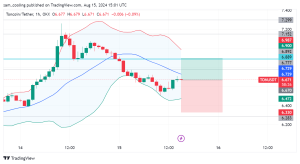Last updated:
 Why Trust Cryptonews
Why Trust Cryptonews

Australia’s competition watchdog has revealed that over half of the cryptocurrency ads on Facebook are either scams or violate Meta’s advertising policies.
The Australian Competition and Consumer Commission (ACCC) conducted research as part of its ongoing legal battle against Meta, the parent company of Facebook.
The ACCC’s scrutiny of Facebook’s crypto advertisements began in 2022 when the commission sued Meta, accusing the tech giant of “aiding and abetting” fraudulent crypto ads that leveraged the images of Australian celebrities.
Despite the lawsuit being in progress for over two years, a hearing date has not yet been set.
58% of Crypto Ads on Facebook Are Scams
In a recent filing to the federal court, the ACCC disclosed that an initial review of crypto ads on Facebook revealed that approximately 58% of the ads breached Meta’s Advertising Policies or were likely linked to scams.
These fraudulent ads typically exploit the likeness of well-known Australians, including entrepreneur Dick Smith, former casino executive James Packer, and Hollywood actors like Chris Hemsworth, Mel Gibson, Nicole Kidman, Russell Crowe, and former politician Mike Baird.
Although the ACCC has not specified the total financial losses from these scams, data from Scamwatch, an Australian Government website, indicates that investment scams remain a significant threat.
In 2024 alone, Australians have reported 3,456 cases of investment scams, with losses exceeding $78 million.
During its investigation, the ACCC identified around 600 ads as potentially violating Meta’s policies, though it is currently focusing on 234 ads.
The commission believes that further examples of deceptive crypto promotions could surface as the legal discovery process unfolds.
Last year, Australian mining magnate Andrew Forrest filed a lawsuit against Meta, claiming that Facebook ads used deep fakes of his image to promote crypto scams.
While the case was initially dismissed, a U.S. judge recently allowed it to proceed.
The ACCC argues that Meta has been aware of the problem since at least January 2018 but has not taken sufficient action to curb the misleading practices.
Despite removing individual ads and occasionally banning associated accounts, Meta continues to display and profit from similar deceptive advertisements.
Meta, in its defense, asserts that it invests heavily in safety measures to combat scams, including removing fake accounts.
As reported, the crypto sector faced significant losses in July as hackers stole approximately $266 million through 16 separate breaches.
Among the most notable incidents was the July 18 attack on Indian crypto exchange WazirX, which accounted for over $230 million, or 86.4%, of the month’s total losses.
Other significant victims of July’s crypto hacks included algorithmic protocol Compound Finance, which lost $24 million, bridging protocol Li.Fi ($10 million), decentralized AI protocol Bittensor, and liquidity provider Rho Markets, each losing $8 million.
In contrast to July, June saw a lower loss of $176 million spread across approximately 20 incidents, highlighting a sharp increase in the value of stolen assets in just one month.














